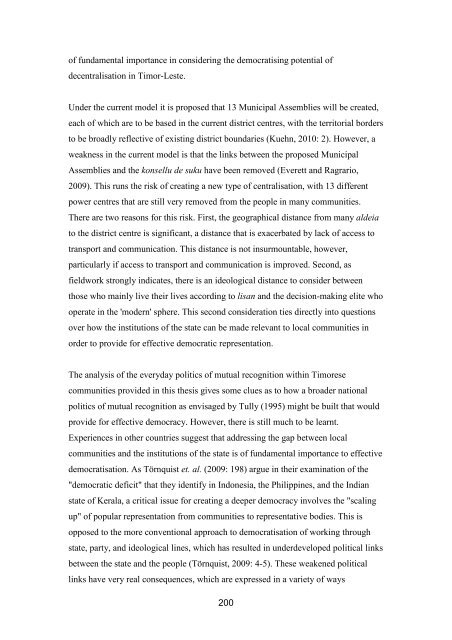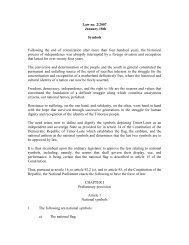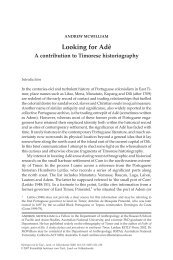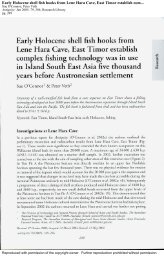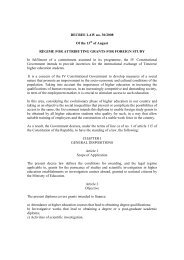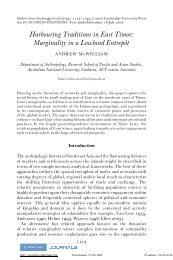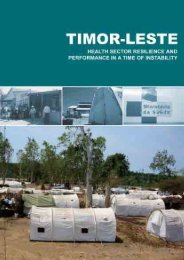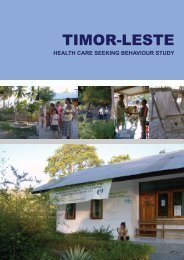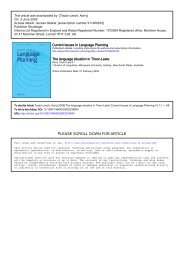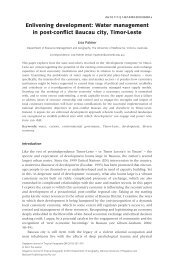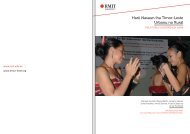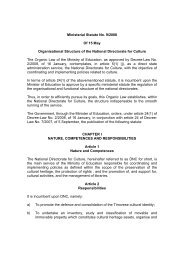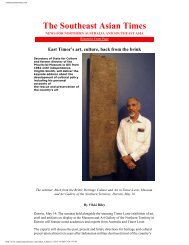Local Governance in Timor-Leste - Secretaria de Estado da Arte e ...
Local Governance in Timor-Leste - Secretaria de Estado da Arte e ...
Local Governance in Timor-Leste - Secretaria de Estado da Arte e ...
- No tags were found...
You also want an ePaper? Increase the reach of your titles
YUMPU automatically turns print PDFs into web optimized ePapers that Google loves.
of fun<strong>da</strong>mental importance <strong>in</strong> consi<strong>de</strong>r<strong>in</strong>g the <strong>de</strong>mocratis<strong>in</strong>g potential of<strong>de</strong>centralisation <strong>in</strong> <strong>Timor</strong>-<strong>Leste</strong>.Un<strong>de</strong>r the current mo<strong>de</strong>l it is proposed that 13 Municipal Assemblies will be created,each of which are to be based <strong>in</strong> the current district centres, with the territorial bor<strong>de</strong>rsto be broadly reflective of exist<strong>in</strong>g district boun<strong>da</strong>ries (Kuehn, 2010: 2). However, aweakness <strong>in</strong> the current mo<strong>de</strong>l is that the l<strong>in</strong>ks between the proposed MunicipalAssemblies and the konsellu <strong>de</strong> suku have been removed (Everett and Ragrario,2009). This runs the risk of creat<strong>in</strong>g a new type of centralisation, with 13 differentpower centres that are still very removed from the people <strong>in</strong> many communities.There are two reasons for this risk. First, the geographical distance from many al<strong>de</strong>iato the district centre is significant, a distance that is exacerbated by lack of access totransport and communication. This distance is not <strong>in</strong>surmountable, however,particularly if access to transport and communication is improved. Second, asfieldwork strongly <strong>in</strong>dicates, there is an i<strong>de</strong>ological distance to consi<strong>de</strong>r betweenthose who ma<strong>in</strong>ly live their lives accord<strong>in</strong>g to lisan and the <strong>de</strong>cision-mak<strong>in</strong>g elite whooperate <strong>in</strong> the 'mo<strong>de</strong>rn' sphere. This second consi<strong>de</strong>ration ties directly <strong>in</strong>to questionsover how the <strong>in</strong>stitutions of the state can be ma<strong>de</strong> relevant to local communities <strong>in</strong>or<strong>de</strong>r to provi<strong>de</strong> for effective <strong>de</strong>mocratic representation.The analysis of the every<strong>da</strong>y politics of mutual recognition with<strong>in</strong> <strong>Timor</strong>esecommunities provi<strong>de</strong>d <strong>in</strong> this thesis gives some clues as to how a broa<strong>de</strong>r nationalpolitics of mutual recognition as envisaged by Tully (1995) might be built that wouldprovi<strong>de</strong> for effective <strong>de</strong>mocracy. However, there is still much to be learnt.Experiences <strong>in</strong> other countries suggest that address<strong>in</strong>g the gap between localcommunities and the <strong>in</strong>stitutions of the state is of fun<strong>da</strong>mental importance to effective<strong>de</strong>mocratisation. As Törnquist et. al. (2009: 198) argue <strong>in</strong> their exam<strong>in</strong>ation of the"<strong>de</strong>mocratic <strong>de</strong>ficit" that they i<strong>de</strong>ntify <strong>in</strong> Indonesia, the Philipp<strong>in</strong>es, and the Indianstate of Kerala, a critical issue for creat<strong>in</strong>g a <strong>de</strong>eper <strong>de</strong>mocracy <strong>in</strong>volves the "scal<strong>in</strong>gup" of popular representation from communities to representative bodies. This isopposed to the more conventional approach to <strong>de</strong>mocratisation of work<strong>in</strong>g throughstate, party, and i<strong>de</strong>ological l<strong>in</strong>es, which has resulted <strong>in</strong> un<strong>de</strong>r<strong>de</strong>veloped political l<strong>in</strong>ksbetween the state and the people (Törnquist, 2009: 4-5). These weakened politicall<strong>in</strong>ks have very real consequences, which are expressed <strong>in</strong> a variety of ways200


